#it hit me in the middle of lunch that october 19 is a saturday this year pls pls pls
Explore tagged Tumblr posts
Text
no no guys hear me out. hear me out here. what if. what if thomas released the finale pt.1 on october 19. because not only is it the anniversary of the first episode, but it is a saturday this year, which is when he posts videos. and and and hear me out, tell me if i'm off my rockers here, this doesn't make sense but it does to me. it's the eighth anniversary of sanders sides, so if they introduce orange, there will be eight characters in the series, including thomas. sorry that made me sound too insane. but like think about it, it's a perfect day to release it! just my prediction.
#the demons are winning#it hit me in the middle of lunch that october 19 is a saturday this year pls pls pls#i just. i need sides content.#me analyzing the clues like its the swiftie easter eggs#sanders sides#thomas sanders#sanders sides finale#tss#fandom rant#ish#watch this bite me in the ass in october#sasi#sasi predictions#mine
183 notes
·
View notes
Text
Chefs Are Helping Hungry Voters Waiting in Line at the Polls
https://sciencespies.com/history/chefs-are-helping-hungry-voters-waiting-in-line-at-the-polls/
Chefs Are Helping Hungry Voters Waiting in Line at the Polls

In this unusual election season, airwaves and inboxes and newsfeeds are jam-packed with images of snaking lines at the polls, discussions of mail-in ballots, and endless back-and-forths about the relative virtues of in-person versus absentee voting. Almost everyone agrees that casting a ballot in the United States shouldn’t be so difficult or so complicated. And one intrepid group of cooks and chefs has decided to roll up its collective sleeve and do something to ease the waits of those standing in line. Chefs For The Polls is the brainchild of the renowned chef José Andrés whose World Central Kitchen has fed people everywhere from Puerto Rico after Hurricanes Maria and Laura and California during the ongoing wildfires. But wait a minute, aren’t havoc-creating storms and out-of-control fires a far cry from the everyday American business of voting?
Nathan Mook, CEO of World Central Kitchen understands the question, agreeing that it was a bit of a leap from offering humanitarian relief in the face of natural disasters to bringing food to polling sites in cities such as Chicago and Atlanta and Louisville. “What is a disaster relief organization that’s on the front lines of earthquakes and hurricanes doing involved with elections in the U.S.?” asks Mook.
But, he explains, “We had a shift in our thinking about the role World Central Kitchen can play in situations that might not on the surface be as obvious as a hurricane. We were thinking, ‘Nobody should stand in line for this many hours.’ And wondering, ‘Is there something we can do?’”
Read our story: “José Andrés’ Generous Helping of Humanity”
And indeed there was. Because the restaurant industry has been so hard-hit by the coronavirus pandemic—especially Mom and Pop places, food trucks, small catering outfits—Mook and Andrés hit on an elegant solution: They raised money from donors to underwrite the purchase of food locally in each city—tacos in Milwaukee, barbecue in Atlanta, cupcakes in Houston, empanadas in Portland, burritos in L.A. Those vendors would offer their particular specialty to people waiting in line at polling places in their city.
The new initiative’s tryout came in June during the Democratic primary in Louisville, Kentucky, where just one polling place was allotted for 600,000 people. “We didn’t know what to expect,” remembers Mook. “We were working with chef Ed Lee who had been doing a lot of work during the pandemic to support the industry. We got a few food trucks, and Ed was there cooking burgers. It was very successful—a nice way to reach families that need food. So we thought, ‘Let’s see what we can do around the country.’”

Chef José Andrés, recipient of the 2019 Julia Child Award, donated a number of defining items from his humanitarian efforts around the globe to the Smithsonian’s American History Museum. The collection, which was on view temporarily last year, includes his stockpot, a stirring paddle and a vest he wore while preparing meals in Puerto Rico after Hurricane Maria.
(NMAH)
Andrés, the high-profile public face of both Chefs for the Polls and World Central Kitchen, is passionate about voting in America, notwithstanding that he was born in Spain during the Franco regime. Famous for television shows and his Washington, D.C., restaurants Jaleo and Minibar, he broke new (and delicious) ground last year when he opened the ambitious Mercado Little Spain in New York’s sprawling Hudson Yards development. Andrés, who won the prestigious Julia Child Award in 2019, says he wanted to give something back to his adopted country during this turbulent election cycle.
“We created Chefs for the Polls to make sure that every American—we the people, Republicans and Democrats, people waiting on line for long hours for different reasons—have the right to a plate of food and water,” Andrés explained to late night television host Trevor Noah in October, adding that in many states, “Men and women, especially in poor neighborhoods, [are] waiting for 3, 4, 12 hours. This should not be happening in America. I’m only trying to make sure every American has the possibility to vote. And bringing food and water to them as they wait in line we believe is the least we can do.”
“You may be a Republican, you may be a Democrat, but let’s face it,” he told Noah, “we are in the middle of the biggest pandemic that we’ve experienced over a hundred years. We need to protect every single American and the very simple act of voting.”
Paula Johnson, curator of food history at the Smithsonian’s National Museum of American History, sees Andrés in the context of the growing movement for food justice, the theme of the Smithsonian’s recent Food History Weekend. “José Andrés is a passionate, tireless, and incredibly effective advocate for food justice,” she says, adding that Andrés “takes action to ensure that individuals and communities have access to healthy, safe and nutritious food.”

As the Covid-19 pandemic continues to threaten vulnerable communities, World Central Kitchen is working with restaurants and kitchens to “get meals to those who need them most.”
(World Central Kitchen/WCK.org)
One result of Andrés’ very effective advocacy is that Chefs For The Polls now has more than 50 restaurants, food trucks and chefs as partners, bringing food that might be a voter’s lunch, dinner or snack to polling places in more than 25 cities. The organization has teamed with Michelle Obama’s When We All Vote and LeBron James’ More Than a Vote, and on Early Voting Day, which was Saturday, October 24, Chefs For The Polls brought nourishment to polling sites in more than 20 states.
“To give is a great feeling,” says Dan Raskin, the fourth generation of his family to run Chicago’s Manny’s Deli. It’s just one of the many small restaurants participating in Chefs For the Polls, and like others, it had been struggling during the pandemic. “It was pretty desolate downtown,” notes Raskin. “We connected with World Central Kitchen and started delivering our food to different neighborhoods. The thing to me that was best about this was not just providing the meals to people but supporting the businesses that are keeping people working in Chicago. So when they came to us and said, ‘We have another program.’ Without hesitation, I said, ‘Of course!’”
Raskin not only offered his Jewish delicatessen’s classic corned beef sandwiches but also turkey sandwiches and a vegetarian version made with marinated mushrooms—something for everyone. Given the long lines to vote, “most people eat the food right away,” says Raskin, but some take it home to savor later. “It’s important to support everybody. One of the things I liked about this: It’s not based on who you’re voting for. It brings the community together.”
And while Chefs For The Polls can’t help shorten the lines—or put an end to the snow or rain or heat bedeviling those waiting hours to cast their ballots—it can ease the wait by putting a little sustenance in voters’ bellies.
#History
2 notes
·
View notes
Text
19-10-20 Sunday I - Indie Daze @ Kentish Town Forum, Saturday 5th October
Saturday, and it was time to head up to London to meet E and attend Indie Daze at the Kentish Town Forum. I took the train and caught up on a few podcasts, and then I was there. E was a few minutes late, but that was no problem, there was time before the first band came on. Probably the last time I saw E was last year, at the Poppies in Wolverhampton, but we fall back into our friendship easily when we catch up. We were at university together, and met in the first year, so we’ve been friends for nigh on thirty years. Shit! Has it been that long?
We went in, and of course it was pitch black, with no natural light, which was a bit disorienting when you know it’s 1pm and broad daylight outside. The first band up were Kingmaker, whose set was okay. Last time we came to Indie Daze the Popinjays opened, and they were very chatty and self-deprecating. I seem to remember them being very grateful that anyone had turned up so early to see them, and they did say that if they weren’t performing that day, they would have been in bed, nursing hangovers – which was refreshingly honest! Not so Kingmaker, they came on stage and were very muso and earnest. They were very much heads down, “here is our music”. The first couple of songs seemed to me to be middle of the road indie rock, and then the later songs were reminiscent of the Wonder Stuff’s sound – I seem to remember there being some comparisons back in the late 80s/90s. Anyway, they properly wigged out at the climax of their set, and it was okay. Kingmaker were never a favourite of mine, and I hadn’t fished out any old CDs or looked them up on Spotify, to refresh my memory. I think I recognised maybe two of the songs? And then they were gone, and we decided to go and get some lunch, giving the swerve to Back to The Planet. We went back to the same café we visited before in 2015, which was nice. They did a nice breakfast last time, so I was looking forward to that. Unfortunately they told me they couldn’t do an English Breakfast in the afternoon, and so I had some delicious pancakes with cream and syrup and blueberries – which slid down a treat. After that brief interlude, it was back to the Forum, and time for Utah Saints to put on a DJ set. To be fair, I wasn’t looking forward to this. I thought the Saints were a bit of a leftfield choice, and on a guitar-heavy line-up they looked to be the odd ones out. They came on stage and were almost apologetic: “hi, we don’t normally talk much during our sets. And we don’t normally do sets in the middle of the afternoon. So if you can just imagine it’s gone midnight, and you’re having a banging night, I’m sure it’ll go well” (or something like that). When they started up, I htought the beat was a bit oppressive, or claustrophobic, but at the first breakdown I was willing the bass and the beat to come back in, so they must have been doing something right. People were dancing too, so I think they went down well. I’d certainly consider seeing them again. Next up was Jim Bob, who was a bit pissed (drunk). He kind of meandered through an introduction, started a few sentences and didn’t get round to finishing them. But once he started performing, he didn’t drop a beat. The old songs sound great, even when performed acoustically. He sang a couple of songs I didn’t recognise, which were from his later solo stuff, but I listened to the lyrics, and made a mental note to search out some of those tracks. I think there’s a bit of material out there I’ve been missing out on. Following Jim Bob were Pop Will Eat Itself, performing This is the Day, This is the Hour, This is... This! It was first released in 1989, so they were celebrating its 30th anniversary. I first got into the Poppies with the subsequent album Cure For Sanity, so This is... This! isn't one of my go-to albums, but I’ve bought it in the interim and I know it well. The Poppies always do a good show, and today was no exception. With Mary from Gaye Bykers I think they’ve rejuvenated themselves, and they certainly know how to put on a show. They performed the hits and they were all good, as you would expect from a band who still gig live regularly. I’m disappointed not to going to see them in Brighton in December, to be honest. There was a bit of an issue with the sound towards the end, but that didn’t stop the crowd enjoying it. When the Poppies had finished their set, the Forum’s front section emptied out a bit, and I felt a bit faint to be honest. E went and got some crisps, and I recovered once I’d had some sustenance. Swervedriver were up next, and I definitely wanted to see them, so I stayed on for a bit. Unfortunately they weren’t as soaring and majestic as I was hoping. I’d not really heard much Swervedriver, my main knowledge of them being their track “Sandblasted”, which I think is phenomenal. But their performance at Indie Daze seemed much more grounded and earth-bound than I was hoping for. By now it was 8:30pm, and I was tired. My mind was very much focused on being homeward bound. Apart from the meal break at about 2:30, we’d been in the dark listening to loud rock for seven hours or so? I decided that I’d had enough: I didn’t want to stay and see Therapy, and if Swervedriver weren’t as colossal as I was expecting, I thought I’d prefer to be on a warm train heading home. I said my goodbyes to E and headed off to the nearby Tube station. This was the second Indie Daze “festival” I’d been to, and it was definitely worthwhile. It was great to see some bands from the old days performing again, and I was very impressed with the Utah Saints set. I’ll be keeping an eye on any announcements they make about next year’s line-up, and will certainly consider going again. TTFN.
via Blogger https://ift.tt/33NsvX8
0 notes
Text
Gran’s Story
Grans Story
I was born in Kensington, Melbourne on 5-1-1923. My family lived near the Flemington Racecourse. My mother Agnes Grey McKissock and father- Joseph Purcell Brown had a lolly shop next door to the theatre. My mother came to south Australia by sailing ship- My grandfather George McKissock was 6ft1in, He came from Paisley, Scotland and had lovely snowy white hair and beard and a beautiful accent, he was a sailor on sailing ships. Stephen has a couple of signing off certificates in his possession. They came to live in Port Melbourne where his wife Kate Lavina Grey rented a double fronted house and the front rooms were turned into a midwifery hospital. Kate took on women who wanted nursing whilst having babies. My grandfather eventually got a job on the wharves. My father’s mother and father apparently had over time a few country inns around St. Leonards and Sussex Way. He was a sailor in the British Navy, I think he left the navy in Sydney and joined the A.I.F his number was 206. I remember living behind a lolly shop next door to a theatre in Racecourse Road, Flemington. I can remember at the age of 3 kneeling on a chair in front of an ice cream can digging ice-cream out with a spoon at theatre intervals. My sister Betty Ellan was born there and not long after we shifted to Ascot Vale to a delicatessen shop where my mother did ALL the cooking- (pies which we had for lunch every school day) fish, cold meats etc etc.
The Depression was on and sadly people owed them a lot of money, the shop was situated in an area where there were a lot of horse trainers, jockeys where they used to tick up everything, so once again we shifted. To Brunswick where I went to school, I was about 6 years old. We had to wait till our house was ready in Merlynston, North Coburg. We had enough money for a deposit on a three-bedroom weatherboard house at 39 Orvieto Street Merlynston, eight hundred pounds and my mother paid 1 pound a week till they paid it off.
My brother Donald George Harry was born here, and we were all so happy. My father at that time was employed on two ships going back and forth to Tasmania, hit his war wounds were a big problem and he eventually received the TPI pension. We bought a car, at least my dad did and each weekend in the spring and summer we ALL mum, dad and 3 kids, uncle and aunts etc would go to Seaford. The car had a big front seat and two dicky seats on the back of it and a big back seat. So, held quite a few bodies. We also went to Hanging Rock for New Years Day and picnics in the autumn a wonderful time for us kids.
It was such a sad time for my mother and father, our long-awaited brother wasn’t doing to well and it was found he had double cataracts in both eyes and some double mastoids in both ears. My mother had measles whilst carrying him for so many years he had to have many operations, the result was vision- 16 inches and partly spastic. My poor mum had to do so much for Don and my Father, taking Don to a private school 3 days a week. My dad was also in and out of hospital.
At the age of 58 years my mum collapsed and died.
The doctors said, “there was nothing they could do for her, she was worn out”. My dad went on to be manager of the Masonic Club dining room in Flinders Street, all voluntary and he died at 72. During all that time mu aunt Kate looked after Don and Dad. She died at 64 in 1963 and then Allen and I took over the care of Don, looking after him. He was living in a cottage environment for many years he had spent 5 years with us. He was 18 when he came to live with us.
So much for my family.
My sister and I went to church 4 times a week each Sunday, 10am Christian Endeavour, Church, Sunday School and church again at night. My dear grandfather would give us threepence every Sunday if we had been good, many a time I would only get a penny. Bet seemed to manage a threepence. We sang in the choir in the Methodist church in our street and each summer and winter we’d get a new dress only to be worn on a Sunday or for something special. I was also a Sunday school teacher until I got ticked off for wearing lipstick at 16 years old.
My life at home- I always had to clean the brass. Perhaps that was how I got to love it so much. I can remember 4 brass candlesticks they had been given to my mother as a wedding present, I had them dated 17th century. I have them here and Tina’s put her name on them, Brass taps, plates etc. We would as kids have to set the table, always a white cloth and a vase of flowers in the centre, a big oval table and then we had to wash up after tea. In those days no dishwasher, only children. As we did that, we would sing our heads off until dad told us to shut up. I also had to mow the lawns, with a hand mower of course and that took hours. For pocket money on Saturdays we’d get sixpence to go to the local pictures and threepence to spend. If we bought our lunch on Friday whilst attending Merlynston Primary school another threepence- one penny for a pie. 1 penny for a luscious family ice block and a lolly. Bliss. I made many long-life friends at that school, 23 of us met in Melbourne 1st Monday in December. The girls who live in Melbourne met monthly, but there is always the phone, not short cats, they’re lovely long ones. Of the 23 girls present last December only three were under 80 (only just). We met at school, friends through teens, dances, shows, weddings and babies. We all knew each other’s families, husbands, some children until we all went off to different places but now, we are mainly widowed, sad really. Some of the girl’s names- Val Creighton, Lil Westwood, Peg Woods, Clarice Roberts and Norma Joyce the only one of us to marry a yank and head odd to the USA but came back here eventually Olive Stubbs, Peggy Cash, Lorna Watts. We played cherry bobs, basketball, have school reports, concerts exams. My dad gave me my first watch when I passed my merit certificate at 13 1/2 , I could leave school then. My first job was at Allen’s music shop, at the information desk, a bit boring, seven shillings and sixpence a week.
Then I got a position at the posh end of Collins street to learn Millinery at Thommy Harrisons. It was the most exclusive salon in Melbourne where I learnt to make hats and sell them. Only people with lots of money could afford to shop there.
My girlfriends told me that first night after I said after I had a few dances with him “hands off he’s mine” and he was. We had a wonderful time together dancing, dinners at lovely places, theatres etc until he went overseas. We got engaged before he went to Manus Island with the 79th Spitfire Squadron on active service. Allen’s brother Jim was in the Navy, he served in some dangerous countries for 37 years, his brother George was in the 6th Division Middle East, Greece and was captured in Crete and was a POW in Germany and came home safely after the war. Arthur was also in 6th Division and was sent to Malaysia, was captured and died on the Burma Railway. Four sons in the forces, his poor mother she has such a lot to bear. Allen came back to Australia to pick up more spitfires and was given leave to come home from Oakey, Queensland. Two days to get home, three days here and two days back there a week and they let him come home again. We married on the 31st of January 1945 at St Linus Church of England in Merlynston at 5pm, I arranged the wedding in 3 days and we had 4 days honeymoon- I don’t know why my granddaughters had to take 12 months or more. We had the reception at the Federal Hotel in Collins Street, and I wore a lace dress with a train and a veil borrowed from a Catholic Convent. The nuns made them and lent them out to all who would like them. They asked what time we were to be married so they could pray for our future happiness. I thought it was a lovely thought perhaps that is why Allen and I had such a long (58 years) wonderfully happy life together. Everyone has their ups and downs and to succeed one must give and take and look after one another in sickness and health. Then whatever setbacks one can always get above them if there is plenty of love about. We had part of our honeymoon at the Hotel, room 21 with a bathroom, very posh and then had two days at the Georgian Inn. So, we had seven days of married life then Allen went off again to Moratie and several other islands. The war ended in August 1945 and Allen was discharged in Bairnsdale 1945.
I went up there to live and keep house for two months. I couldn’t cook much, but I soon learnt, not like you girls- we weren’t allowed in the kitchen, perhaps because of food rationing. I don’t quite know why as my mother was a lovely cook. We had three honeymoons altogether and between postings it was at Bairnsdale I learnt I was pregnant, thrilled to bits we were. When Allen left the air force, he went to Tech school at night to brush up on his carpentering. We lived with mum and dad in Merlynston. Ian was born 19th of August 1946 and by then we had bought a block of land for 55 pounds at 14 Edward St, Fawkner and were planning our home. Materials were very hard to get, and one had to go on a list to buy things. We gad enough money to build the back of our house, one bedroom, nursery, big kitchen, sunroom, laundry and bathroom combined. Allen worked very hard to get it ready for when Stephen arrived on the 17th of October 1948. We shifted in when Stephen was three weeks old, we furnished our house very comfortable with bits and pieces relations gave us and were quite happy to do that. Later on, we built on a bedroom, hallway, bathroom, and lovely big loungeroom. In 1950 Allen decided to join the police force, he did very well in all his studies often coming 1st or 2nd. He was the only married bloke in No.5 squad and lived out. The single fellows lived in barracks, he even learnt to swim. Allen’s first police station was in Brunswick and by then we decided we’d like a little girl. Ian was at Lynch Road School and Stephen had just started, Stephen and Ian shifted into the middle room, us in the front one (even had a walk-in robe!) The nursery was empty, Robbie John arrived on the 11th of May 1955, and so we gave up the idea of trying for a girl. Allen’s mum had 9 boys and two girls; the girls arrived last. Allen finished off our house and we even had a road made by then, he was doing very well in the police force. Allen was promoted to uniform to plain-clothes detective and went to Airlie College and came out 4th of 36. It was very hard demanding work, all shifts life was a struggle in those days, but we managed to buy a car, a Morris for 100 pounds then in 1952 an A model ford for 50pounds, Allen’s pride and joy. What fun we had picnics, rabbiting, mushrooming, wood gathering. A picnic consisted of a cooked leg of lamb, jar of beetroot, pickles, loaf of bread, butter, tomatoes, white onions and fruitcake- wonderful. Pop and Gran Mumford lived 5 minutes away across the paddocks, we all used to go to Sunday school night tea. Geoff, Dorrie, Jean were home enough to have a footy or a cricket team, great times.
Then, Allen was talked into trying for a country station, Wedderburn the first, what excitement, had to rent out my lovely family house everything just right. Garden was lovely- we shifted just after Christmas 1958. Allen had the Ford all done up as he had to use it for the Police work and away we went with the trailer on the back, on board more incidentals plus bikes, dog, dog kennel, 4 bantams on eggs, 1 possum and I imagine a lot of pot plants. I was his unpaid offsider, After Wedderburn we went to Violet Town the Yarra Junction, each town provided for all us new experiences. Wedderburn was a small town, 3000 people all very friendly, a lovely big old house and an office looking out onto a village green where cricket was played in the summer. Stephen went down to the local milk bar, he was breathless when he got back, the man said we could have a loan of a cow and he had two and not enough feed as we had a Lucerne paddock we accepted. Me on the condition I did not have to milk her. Flossie, A jersey cow. I did learn how to milk later as Allen would sometimes be caught up with work and the boys would be playing sports etc. I also had a piglet given to me for Mother’s Day, when sold 5 months later $79 came my way. I mothered in the first 6 months, 5 baby lambs, a clucky hen who sat on 10 duck eggs, rosella parrots and galas on my combustion stove hearth who all had to be hand fed. We had a possum who ate roses, fruit and chocolate. I even made my own butter, separated the milk and supplied everyone who called in with jars of cream and homemade jams. My town friends could hardly believe but it’s all true.
Our inspector came once a month for lunch and this day Allen had Fred, a simple lad in the lock up. He was caught flashing himself off to school girls. I had to give him lunch also, so inspector said “what are you going to give Fred for lunch?”, same as you I said, but I put a bit more bacon on yours” and the inspector said “are you going to put it on a plate with a fork and knife?”. “yes” I replied. “well” said the inspector “He could break the plate, cut his throat, stab himself with knife and four times with the fork” so, Fred’s lunch was on an enamel plate with an enamel cup and a spoon, one soon learns. Another time, a runaway boy who I had already made him a great heap of sandwiches, Allen came in and said “he was still hungry”, we had, had a flower show and cooking competition, I won the lamington prize and I bought the prize fruit cake, I don’t know if Allen told him what he was about to eat but he never left any.
Next stop Violet Town- Allen’s mother and father were born at Boho and Warrenbain in time we found we were related to half the town. We’d have weekends when Allen’s parents would come up and have open house and all wonderful stories these relations would tell. The Hume Highway was very bad for accidents, dreadful ones- trucks-many times I’d have injured people to look after and feed till their relatives would come and pick them up. Once, Allen and the shire engineer (he said he would help) a truck with milk powder and a truck with 250 sheep collided, what a mess. Both trucks caught fire and by the time Allen got there the sheep were running up and down the highway with their wool on fire. All the sheep had to be destroyed, nothing much left of the two truckies but the shire engineer never offered to go with Allen again.
Next Stop- over the mountains to Yarra Junction. What a difference. Mountains. Huge gumtrees. Ferns and a house on the side of a mountain and facing Bencairn near Donna Buang. Within 3 days it was all on fire. I didn’t see Allen for four days and then I saw him on the TV. Allen and a ranger tried to get two boys and their grandparents to leave their house as it was in a valley surrounded by trees, but they said “they would stay” so Allen couldn’t do much about it. After the fire they went back to find them. They had all perished on the way out in a ute. The house was still standing, so very sad. The fires were over by Wednesday and Dianna Trask’s wedding was on the Saturday. Allen in one car containing a policeman, his wife, myself, 3 boys and two girls in the back of our station wagon, we were the crowd control.
People came from everywhere to Warburton it really was a circus, church windows full of faces, the brides father had his wallet pinched out of his pocket, after all that Allen had to make way for the bride and grooms car to the reception with a green Holden station wagon with all of us in it and one of the kids yells out “look they’re kidding!” what fun we all had. After the fires the ferns grass and trees were all starting to shoot after 10 days. Plenty of snow in the winter to play in.
After two years Allen and our family had to shift back to Melbourne to Seaford to take up a promotion what a shock to our systems, the people were so rude, always in a hurry and didn’t care about one another. After a while I was a bit lost after having been so busy for several years. I was lucky to meet with Winifred Moss a well-known dressmaker for the wealthy, also did beautiful society weddings, entered the gown of the year 7 times and won 3. Winifred wanted someone to do beading and bridal headgear. I started at 3 ½ days a week and ended up doing full time. I was offered a position at Haileybury College looking after 700 boys and masters in sickbay. I loved it, I also had to show overseas visitors over the school and do flowers and decorate the reception rooms when needed.
Allen was not at all well and became very ill and was discharged on medical grounds, as a family his boys and I were very proud of our policeman and the wonderful life he had provided. I retired from Haileybury and we bought an old house on a big treed block near the beach in Rye. We spent many happy years renovating and creating a lovely garden. My garden was featured in Home Beautiful as the best CWA garden on the peninsula.
We decided six months after finishing the house to move to warmer climes, to Maroochydore where we had, looking back 5 ½ years of holidays. But we returned to Victoria as our granddaughters were growing up without us around.
Ian, Heather and four granddaughters in Tinamba
Stephen and June and two granddaughters in Canberra
Rob and Sue in Lakes Entrance
We settled in eagle point and the mozzies made us move to rosebud, where the traffic made us move to Maffra, just the right type of place we were looking for. Lovely little town, very caring people, loving friends and I hope I have many more years among you all.
Sadly, Allen passed away in April 2003, a brave man.
We now have 6 granddaughters and seven great granddaughters, and hopefully someday maybe a great grandson.
0 notes
Text
Old Friends and New Beginnings: October 19-26
There’s something about being in transit that allows me to relax.
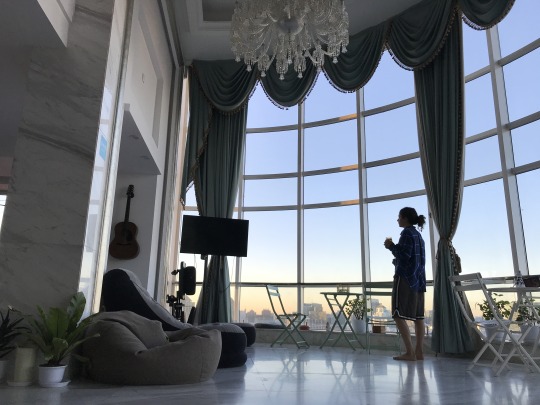
The work and planning that got me here are in the bank. What’s waiting on the other side, for the time being, will have to do exactly that – wait.
In transit, all that’s left to do is be still.
My favorite thing to do on an airplane is take off into a dream. With my sleep mask on and eyes at ease during taxi, my mind listlessly flits between thoughts that seem to become slower and less interesting until sleep overcomes my consciousness as we ascend into the clouds.
When we’re almost there, I’m at once hesitant and ready. The sleepy interim sanctuary is coming to a close. I know that once we hit the ground, it’s game time.
I’m ready though. All the motions are familiar and ingrained like muscle memory. No matter where I’m arriving- old place, new place, or completely alien environment- the process is the same – collect my belongings, make my way through the hoops and past the hawkers, and successfully get a connection “home.”
What makes this step different than transit? It’s active. You have to put your brain to work. The short bursts come swiftly and require adept attention and skill.
Transit is passive – you’re passing from one place to the next with no involvement. In surrendering control you have two choices: stress or peace. I choose peace. Unless I have hold my bladder the whole time...which isn’t the case on an airplane or a train, thankfully :)
Anyway! So I’ve arrived back in China after a very extended and wonderful holiday!
6 weeks in Central Asia where I found bliss in beauty – natural, historical, interpersonal, and inside myself
And 8 weeks at home in New York where I fell in love with my roots – my family, my friends of old, and my hometown
All these experiences came together to buttress my deep appreciation for that all I have and what is yet to come.
Upon the rock solid foundation of my upbringing, I have gathered the building blocks for the life I want to lead and have arrived at the next adventure that will continue to help me build the tower. #BurjDubai. #Rowing #Ryan
SO ... let me finally dive right in to what’s been unfolding in these two weeks since I touched back down in China!
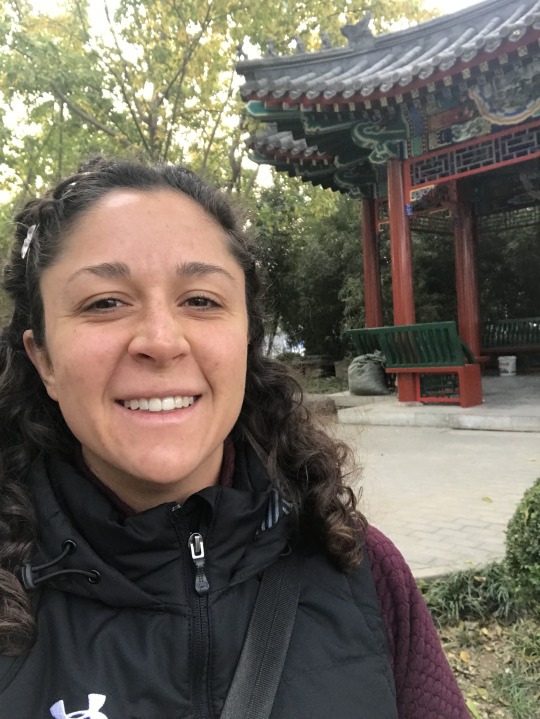
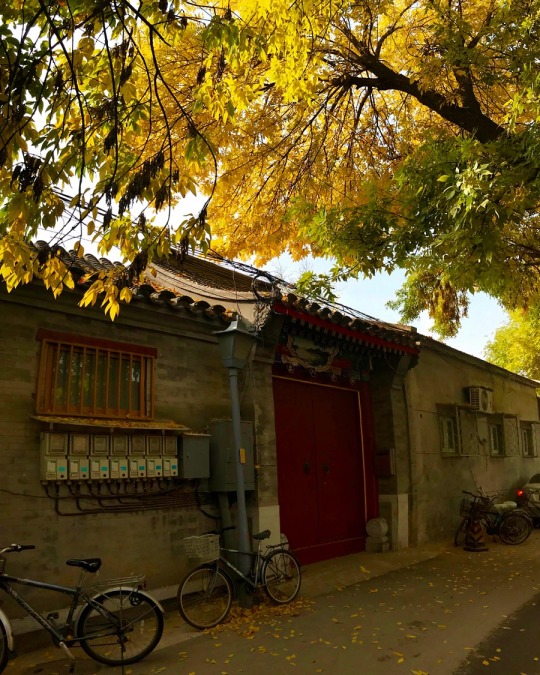
I hit the ground running. That is, until exiting the airport express where it took me 30 mins to get a taxi from Dongzhimen to Dongsishitiao...a 5 min drive but on a Friday night at 10pm... anyway I finally nabbed a black cab and shuffled my way through the hutongs to my hostel where I promptly fell asleep.
Since before departure, I packed my Saturday schedule with friend meet-ups. So starting Saturday morning I was whizzing around Beijing.
At 7:30am I was on the subway down to Chongwenmen to see the Doc at 8! He met me wearing an old-fashioned Mao shirt and hat, hot bowl in hand, to pick up some breakfast. We made our way to a bustling local breakfast joint where he collected the yums. At his home, we of course had tea with Tracy, and caught up about our summer holidays. We even munched on pomegranates. As he’s a busy Doc with a loaded schedule, by 9:30am I was headed out in a cab with the two large suitcases I had stored at his house all summer.
At 10am, I was back at my hostel and starting on the task of trying to downsize my possessions. As anyone can imagine, this was harder than it seemed! I only managed to put 3 sweaters into the donate pile, and sealed everything back up, unimpressed with my will power.
At 10:30, I set off on a bike to meet my now former-roommate, Emmie, for coffee in Dongzhimen. We had a really nice time! My salted caramel latte at Wagas actually had some pepper sprinkled on it too?! Very pleasant surprise. Anyway, Emmie and I had a great chat catching up!
At 12pm, we were both off to our next plans. For me, that meant going to see beloved Berit! At 12:30 we met at Dongdan station and headed up to Jingsu for a vegetarian lunch. I’m talking lots of greens, pumkin & egg dumplings, and olive & veg dumplings! Yum! After lunch, we walked to her new hutong apartment – it’s lovely! – and then back to my hostel where we picked up my camera and strolled over to Ditan park to enjoy the fall foliage for the afternoon. We then looped back around to my hostel because I desperately needed her help trying to eliminate somethings... I would up donating to her some more sweaters and hats. Still, not enough to really consider it downsizing, but hey, I tried! We hugged goodbye and I was off to the next meet up.
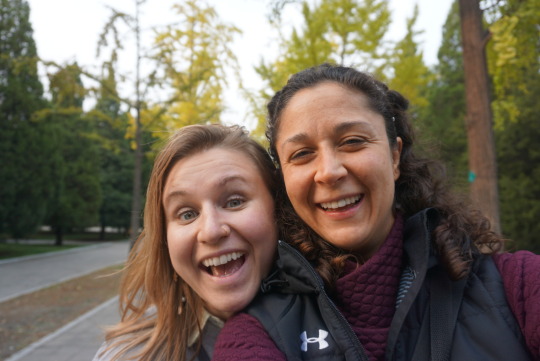
At 7pm, I was in a taxi headed up to campus to meet Phil from Ghana. He oh-so-graciously agreed to keep some of my luggage in his room while I’m in Hohhot for training. So I brought with me one large suitcase and my osprey backpack. Once we settled the stuff, we went for a walk out of east gate –which has totally changed! They shut down a lot of the thriving restaurants in favor of some weird artistic face-lift? Definitely government mandated. If that had taken place while I was a student... Tom and I would’ve committed mutiny, I swear it! Anyway, we grabbed some fruit and took a bench at the pond to admire the ducks and delve into some deep convo about China, life, and politics. Yeah!
At 9:30pm, I set off to meet Dennis! This meet-up was last minute because Emmie had conveniently told me Dennis was back in Beijing and I got so excited that I demanded he make time for me, and it worked JIt took me literally 30 minutes walking from campus to find a functioning OFO (I will dive into this later because the bike sharing industry fascinates me). Anyway, I eventually got on a bike and made my way to Boxing Cat! Boxing Cat is a famous brewery in Shanghai that recently opened in Beijing, and they were holding a grand opening party ... which I’ve since found out is there ump-teenth “grand opening” since July. But it was so great seeing Dennis! It had been 2 years since he left Beijing – coincidently I went to his going-away party just as I arrived to start my masters! It’s great that he’s back!! I love catching up with old friends!!!!!
Berit and Dennis are my friends back from 2013 and I will love on them forever <3
So that was my amazing amazing Saturday. It is incredibly rare for all of these people from different parts of my life to have free time exactly at the right time! I am so grateful for all the people in my life and for the blessings of planning :)
Sunday morning I was off to the airport at 6am to catch my 9am flight to Hohhot. Unfortunately, I didn’t check the baggage allowance, and wound up having to pay 240$ USD for my second big bag. Oh well, there was nothing I could do! Hopefully I will get that money reimbursed by the company.. fingers crossed!
I arrived in Hohhot to a LOT of smog and a LOT of gray and a LOT of construction. During my cab ride from the airport to my hostel, I could see that nearly every road in Hohhot is under construction... at the SAME TIME. They are simultaneously putting in the subway (2 lines), and elevated highways with beams reaching up in the middle of the major N/S and E/W roadways. It’s a nightmare, really.
But my hostel turned out to be a DREAM. It’s brand new, and beautiful. And there was even a beaming golden angel waiting in the lobby for pets! I was in heaven. Even more so when I got to my room and showered and got into bed for a much needed rest.
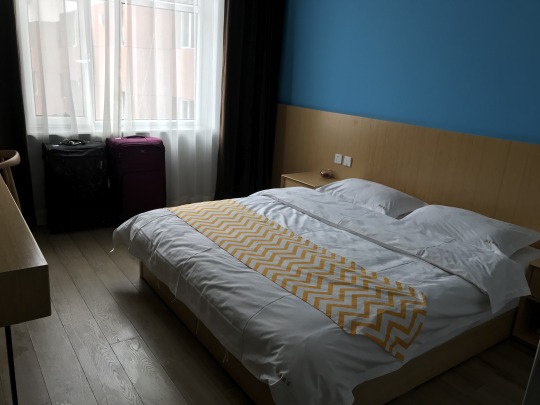
At 2pm, I communicated with my HR person about the housing situation for the next few months. She informed me that the other foreigner they hired (girl from Indonesia) had just secured a place in a good location, and that it actually had another vacant room. So I got in touch with her (Zhen Zhen) and planned to head over later in the afternoon to see the place.
At 4pm, I got into a taxi to meet Zhen Zhen and see the apartment. It was a very modest room in a big shared apartment of 7 rooms total, 1 bathroom (well kept), and no kitchen. The apartment is a 20 minute walk from Yili’s training school. At first I was a bit skeptical because I hadn’t seen any other apartments, but ZhenZhen and I came to the conclusion that it was the best option. Which it was! I signed the contract on the spot. My rent is 550 yuan per month. That is 80$ USD! Amazing!!!!!
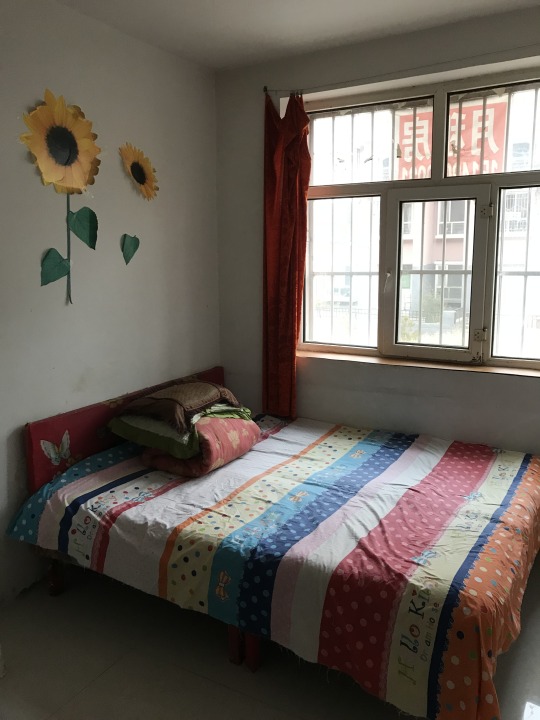
The low-down from ZhenZhen about our new job was invaluable and I will explain it here.
Firstly, remember how I said Yili had hired 3 Malay, 3 Indo, and 1 American (me) for this pilot-year International Management Trainee program? Well, turns out it’s only me and ZhenZhen. The others either didn’t accept the offer, or initially accepted it until they found out they’d be training in Hohhot for three months. So Zhen Zhen and I are the only two foreigners – the first that Yili has ever hired!
Secondly, this training is LEGIT training. We have several weeks of classes in Yili’s training school where we will learn every facet of their business, culture, systems, and strategy, after which we have an internship rotation in Yili’s factories for two months – which will include 8-hour day shifts, and 13-hour night shifts – in every stage of production from lab work to packaging to shipment. In the factories we will be only observing, but the goal is that we will become very familiar with every aspect of their products from start to finish.
WHAT? Yeah that’s exactly what I said. But I’m so pumped for it.
On Monday morning, we were set to go to headquarters to meet our bosses. It turned out that we were to meet THE boss, the BIG boss, THE milk man himself.
So what do you know, on my first day I got to personally meet the CEO, one-on-one.
He’s a really nice guy! He had my resume in front of him, and we had a nice chat! As it happens, his brother’s son is attending GW in the school of business! My alma mater! Very cool coincidence. Then, it also turns out that his daughter is studying at Fairfield University in CT, and that he himself regularly goes to Stamford and Westport not only on business but for health reasons – ie, relaxing in the nature. Stamford is where my aunt lives, and it’s only 45 mins from my house! Another very cool coincidence! And then he said that he wants to take me to America to meet his family?! And asked for my WeChat and email?? It was so cool!
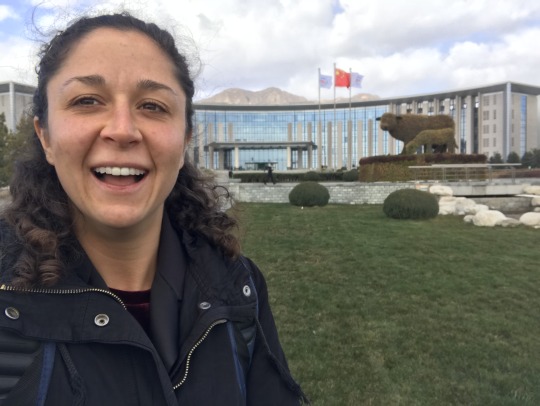
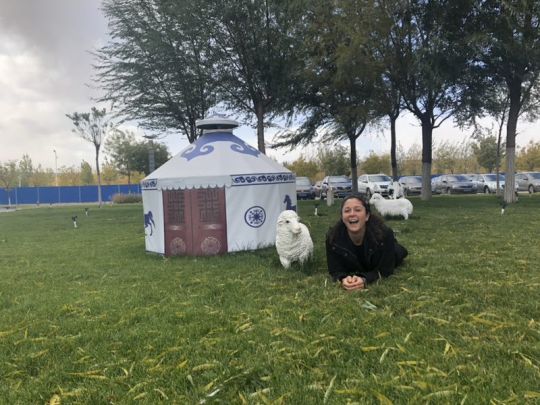
After the meet-and-greet, ZhenZhen and I had lunch at headquarters with one of the HR people, then got in a cab to the training school.
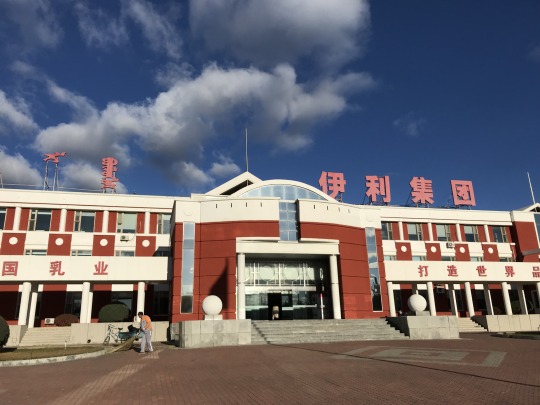
So there was a group of new hires that started their training back in July. About 60 Chinese hires. While Zhen Zhen and I are just beginning, they are just wrapping up. Fortunately, we had this week as overlap in the classes. They were all really sweet! Mostly girls – out of the 60 there were only 7 boys. No clear reason why, but no matter. Everyone was really really nice!
Class that afternoon went way over my head. What I learned is that there is a difference between understanding conversational Mandarin and understanding academic classroom Mandarin – where they not only use a plethora of vocab that I don’t know, but they also speak a mile a minute! I kind of just sat in awe and wrap attention trying to pick out some things. Thankfully, there was a powerpoint – a life saver!
Around 4:30pm, tiredness came over me like I’ve never been tired before. It was only then that I felt jet-lag. I knew I had been waking up very early, but other than that I felt great. Until that point. I had only arrived on Friday night, and it was only Monday afternoon – but it felt like I’d been back forever, and SO much had happened already! So when class ended at 5pm, I had to turn down invitations for dinner with the new friends. I had to. I have learned from experience, where I’ve tried to power through, that I can’t do it and only wind up becoming the subject of attention/pity at my pitifully lackluster tired state. So I bowed out and went to sleep immediately when my head hit the pillow around 6pm.
On Tuesday morning, I had to move out of my hostel and finally move into my new room! That meant taking a taxi around 7am to the apartment, dropping my bags, and immediately heading out to the training school. It was smooth going, thankfully.
At 8:30am Tuesday morning I had a meeting with the headmaster of the training school to go over the training program in brief. He is really nice! He explained to me the course that the other group had taken – first, they had military training for 2 weeks, then they completed their factory rotations for 2 months, and now they were wrapping up their 3 weeks of classes, and were all preparing for their small group presentations (to be held in Beijing) the following Tuesday. He informed me that Zhen Zhen and I were to follow the same program, though in a different order. He also mentioned that she and I’s training might vary in length, but he didn’t elaborate after that.
You can imagine that I was pumped and also saying what the fuck. Classes? Factory rotation? Cool! But military training?! I’m a foreigner??? What?!
So let me unpack this. China does not have conscription. However, in middle school, high school, university, and at some companies, every student must complete military training – which involves waking up at 5am to do exercise, drills, walking in step, and so on. The headmaster told me that the purpose for this is to teach everyone how to endure hardship and to ingrain the fundamentals of teamwork.
I get that. But still, I’m foreign? Logic? Anyway, it turns out that either I misheard him (even though I’m pretty certain he did tell me we’d have to do it earlier than later because of the impending cold weather) or the plans changed – because once the training school coordinator sent Zhen Zhen and I our schedule, it was obvious that we were booked through mid-January with no sign of military training. Yes!
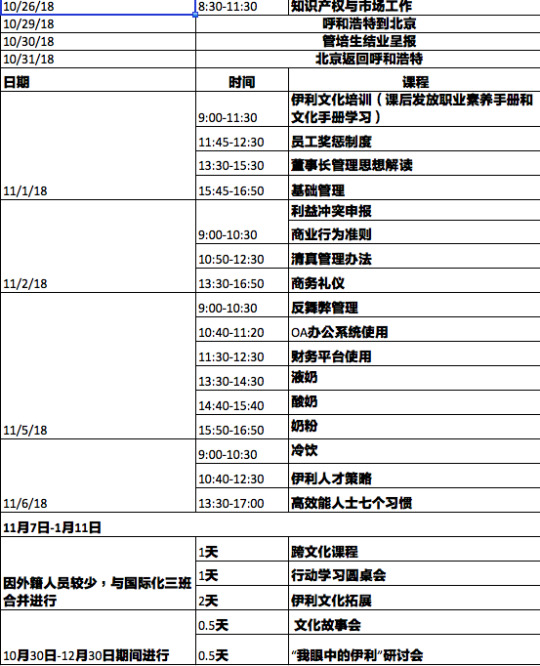
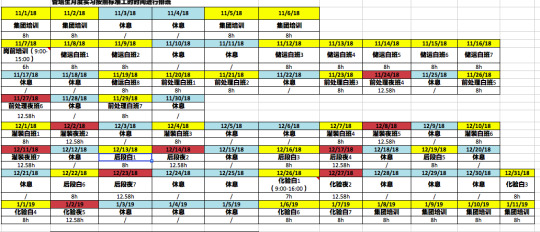
At 9am, class beguns and I was off to scribbling down every word I didn't know in my notebook. Still, the speaker’s pace is way over my head but the PowerPoint is excellent. Bless.
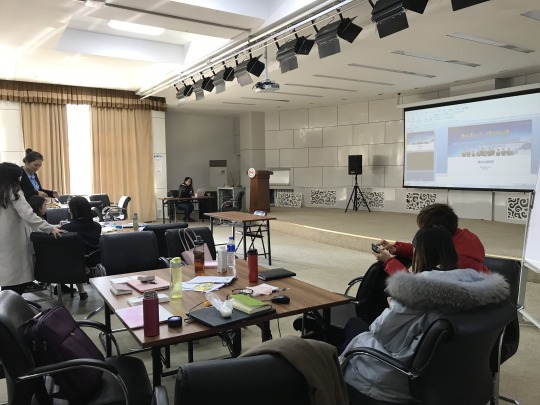
At 12:30pm we got released for lunch. There is a cafeteria in the building where we all eat for freeeeee! Yes! I get to know more of the fellow students. Again, they’re all splendidly sweet! Feeling good.
At 1:30pm we started our next class. More ferocious note taking. I’m learning a LOT.
At 5pm we are finished for the day. I received a WeChat message from the CEO’s assistant, asking that I give her a call. What?! So I did. She’s very sweet. Her English is flawless. She wanted to tell me that if I need anything at all, I can reach out to her. She also wanted to get my feeling about going to the United States to work for Yili. I told her that after completing my training in Hohhot that I want to get experience working in their Beijing office for at least 6 months to really get to know the company before making any move home. But ultimately, I told her, she and the CEO are the boss and I’ll do what is needed of me, of course!
At 5:30pm I went to dinner with Zhen Zhen and the girls at our table for dry-pot and other yums. It was delish and I was NOT exhausted! Yes!
That night I started putting all the new vocab words into Quizlet. The best study tool! I love it! The data-entry at the beginning is tedious of course, but then the website itself has so many ways to learn and practice your new words. It is a dream.

I hit my pillow early again, as expected. It’s a good routine! Though definitely still the product of jet-lag.
I realized that given the time I going to spend in my room – I am definitely in desperate need for new bedding and furnishings. The hard lousy pillows and ugly sheets and blanket stink of smoke. Furthermore, there is no storage space for my clothes.
On Wednesday morning when I woke at 5am, I took to Baopals in search of new furnishings. My accumulated total for furnishing upgrades came to over twice my rent for this little room, but it’s a very worthy investment! Especially because my rent is so cheap :) and there’s not much to do here...
The location of the training school is in the west part of Hohhot, approximately 30 minutes in a taxi (on the highway) from the downtown area. It is conveniently a 20-minute walk to the training school. (The headquarters is another 40 min cab west of my place)
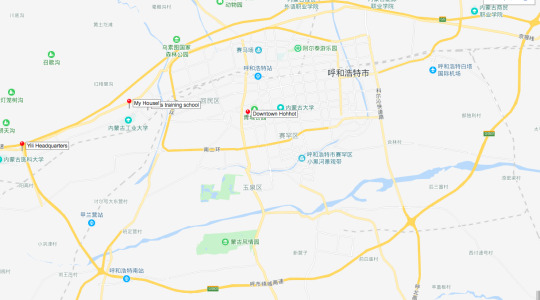
But there’s nothing around us to DO. Yes, there’s every kind of Chinese restaurant and food store and express shipment store, etc.
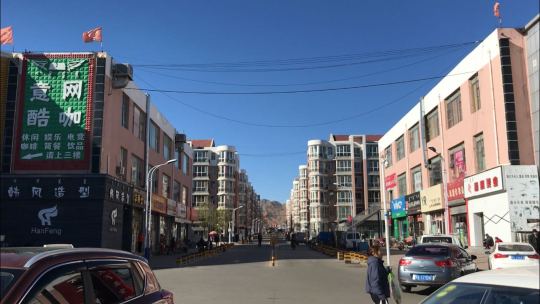
But in terms of activities? None. Literally none. And it’s cold outside. And the roads outside of my complex look like this.
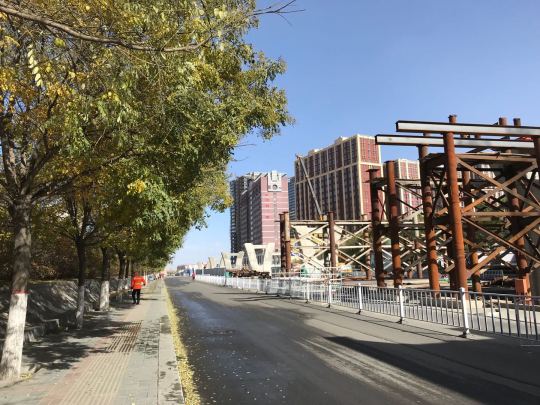
So I made it my mission to make my room amenable to the large amounts of time I’ll be spending in it – ie: cozy and comfy and very me!
Later in the morning, 8am, ZhenZhen and I walked to school together to meet an HR person that was to take us for another health exam, required of everyone going to the factory. The hospital was huge and new, in the tacky but cool Inner Mongolian style. Though it smelled of smoke and Chinese medicine. We had to do 3 procedures. 1) Blood sample, 2) In one of the the weirdest things I’ve done, we had to do a stool sample – neither Zhen Zhen or I could poop soooo we had to use a q-tip to get a butthole swab! Very traumatic LOL. And 3) we did a chest scan thing. I don’t know why every physical exam in China requires those, but maybe it’s because I don’t know what it is or does.. you just have to hug an x-ray looking machine. Anyway, the trip to the hospital was a quick laugh in the end, and we were back to class.
Class was easier to understand because I had been studying vocab all morning after completing my shopping. After all, in business, the same words keep coming back around too. Yes! I’m understanding more!
During lunchtime, ZhenZhen and I had the task of booking our train tickets to Beijing for our first short “business trip”! Because the big group is finishing their training, they are giving presentations in Beijing to leaders at the branch there, where they’ll soon start working full time. ZhenZhen and I made to go along for the ride, because, of course, it will be very valuable to listen! I was not complaining at all! We were set to leave on Friday at midnight, and come back on Wednesday. Let me break that down – Saturday, Sunday, and Monday FREE IN BEIJING, then Tuesday listening to presentations in the morning and a farewell conclusion party for the big group in the evening? For us, it was like we were being gifted at the beginning instead of the end! Literally, gifts..
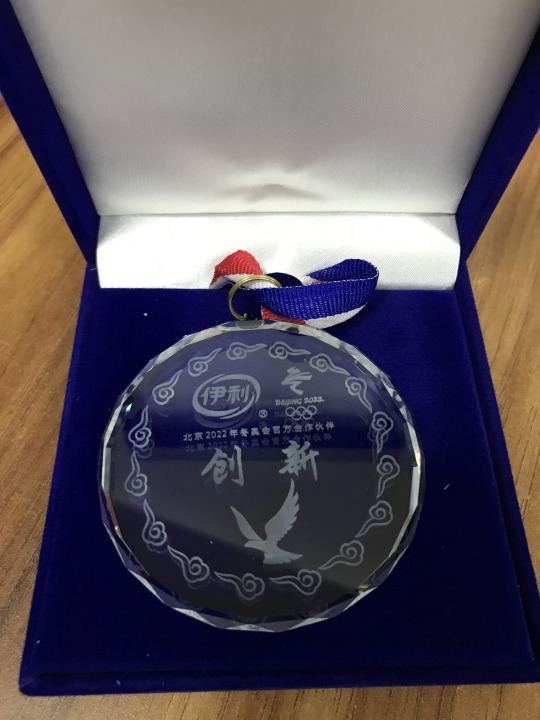
Back to school. A different department head gives each lecture. So in the afternoon, we heard from the guy that ran Yili’s Olympic sponsorship committee! Admittedly, I didn’t understand much of what he said, but he was definitely a compelling speaker and from his PowerPoint I added a lot of new words to my vocabulary list.
After class ZhenZhen and I went home, where we chilled and slept.
Thursday morning I had to miss class about eCommerce platforms (my favorite topic, unfortunately) and go with Zhang Na to the government offices to register for social insurance and for my residency. It was great to have her handling everything and not having to be responsible for it myself! What a relief!
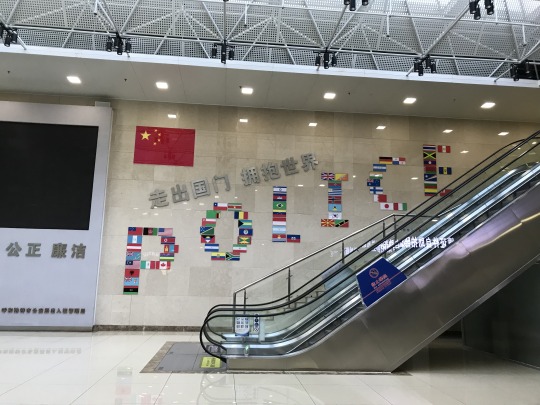
We finished around lunchtime, and went to pick up ZhenZhen for a special lunch! Zhang Na took us for ice lamb hotpot! Apparently, the ice in the hotpot makes the lamb take on a different flavor. They also add some yogurt and red alcohol to the broth. It was delicious! Though Zhang Na made us each eat way more than we would have liked... I wasn’t complaining :)
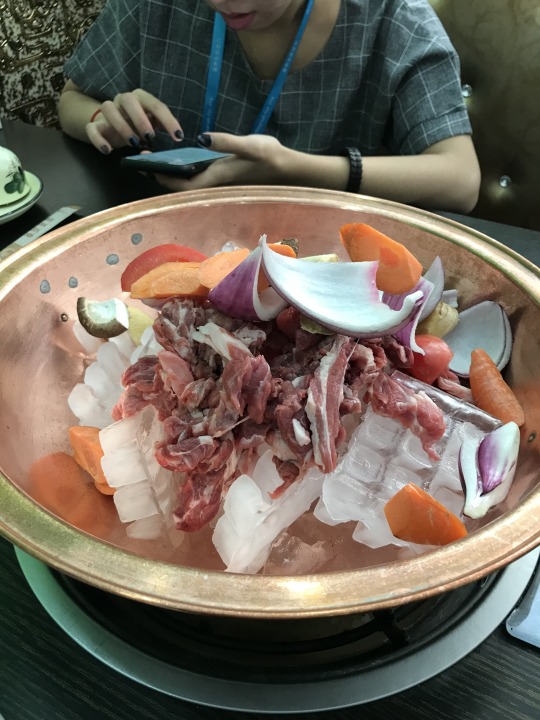
That afternoon’s class was about sales channels. Lots of interesting stuff and new vocab.
Friday morning was our last class with the big group! The topic was about intellectual property rights in China, which I found incredibly interesting. The teacher was easy to understand and the topic very relevant. Happy Cola.
After class we took a big group photo.
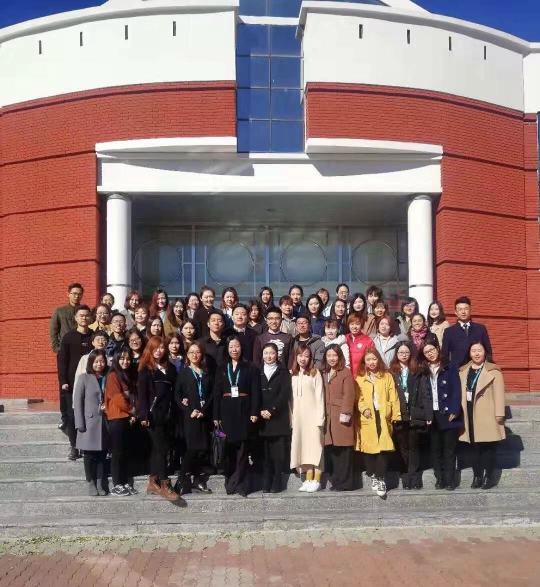
Then we all headed home to pack for Beijing!
By Friday evening, only two of the items for my room had arrived, but that was OK because it gave me a lot to look forward to upon my return from Beijing. Everything would be in by that point so I could decorate all at once! Score!
At 10:30pm, ZhenZhen and I headed out to Hohhot East Railway station to get on our night train to Beijing!
What a serious whirlwind of a first week back in China! From seeing all the friends in Beijing on arrival, to moving to Hohhot and learning so so so much new stuff over the 5 days about how my life is going to take shape with this training and factory internship rotation, to again boarding a train BACK to Beijing for 4 day break? I am so lucky and happy and just doing it!!!! Ah! Amazing!
Stay tuned for Week 2!
0 notes
Text
'From now on you have no name. You are prisoner 217': life in a Cuban jail
'From now on you have no name. You are prisoner 217': life in a Cuban jail A brutal high-security prison was the last place Stephen Purvis expected to end up when he moved to Havana. Stephen Gibbs tells his story Stephen Gibbs Sunday 19 March 2017 09.00 GMT If you happened to go to a British embassy reception in Havana in the early 2000s, you would likely have met Stephen Purvis. You could not miss him. Six foot four, cropped grey hair, rum in hand, a broad smile and no shortage of good stories. Purvis loved Cuba. Escaping what he saw as the risk of a "pre-ordained suburban middle-class life" in Wimbledon, the architect and his wife seized the opportunity to move to the island 17 years ago. He had been offered a job as development director with Coral Capital, an investment and trading company. It was one of several small foreign firms – almost all led by maverick, adventurous individuals – that were setting up in Cuba as the country sought international partners following the collapse of the Soviet Union. Purvis's job was to look for joint venture opportunities with the Cuban government. The planned projects included the first golf course to be constructed there since the 1959 revolution, and the revamp of a formerly glamorous hotel, the Saratoga. Speaking to me from Myanmar (more about that later) Purvis recalls his early Havana years. "It felt like another era," he says. "No internet. No TV. No shopping." The family adapted well to their new life. Home was a handsome 1950s villa, soon full with their four children. Saturdays would be spent by the pool at the beach club. The son of a theatrical designer, Purvis also dabbled in theatre himself, producing the Cuban dance show Havana Rakatan, which performed successfully for several years in London. No one, of course, imagined that those halcyon days would end so abruptly, with Purvis imprisoned in what he describes as a "zoo" for enemies of the state. But that is how it turned out. The title of his powerful memoir, Close but No Cigar, is his own admission of just how badly life can go wrong. I last saw Purvis in Havana in 2011, a few weeks before his arrest, at a New Year's Eve party (I had been the BBC's correspondent in Cuba between 2002 and 2007). The arrival of the New Year is a big deal in Cuba, partly because it coincides with the anniversary of Fidel Castro's revolution. Two of President Raúl Castro's daughters were at the event. By then, the mood among the expats doing business on the island had notably soured. Many were whispering that this would likely be their last fin de año in Cuba. All knew someone who had been caught up in a mysterious but ever-widening series of arrests. Two prominent Canadians, Sarkis Yacoubian and Cy Tokmakjian, had been detained since the summer. A well-known Chilean entrepreneur, who used to boast he was a friend of Fidel Castro, had been convicted in absentia to 20 years in jail. And Purvis's boss, Amado Fakhre, the British-Lebanese CEO of Coral Capital, had been imprisoned in October. "The sense of an impending doom was growing day by day," recalls Purvis. He says he'd be the first to admit he was "an idiot" not to leave the country when he still could. But he was convinced he had done nothing wrong. None of the imprisoned foreigners had at that stage been formally charged with anything, but the assumption was they were caught up in Raúl Castro's pledge to root out corruption. The younger Castro had formally taken over from the ailing Fidel in 2008. In 2009, he established a comptroller's office, tasked with investigating evidence of misdeeds among communist party officials, managers and state company employees. It was turning out to be a never-ending task. Cuban state salaries are all around $20 a month. To varying degrees, everyone does something technically illegal to survive. By 2010, hundreds of Cubans, including ministers and senior executives, had been detained or dismissed. The net was widening to the foreigners, who were also breaking the law by paying their employees any bonus on the side, or even buying them lunch. Purvis, who admits paying a small pension to one ex-employee, is convinced that the mass arrests were not in fact about corruption, but instead the clumsy purge of Fidel Castro's old guard, which was being replaced with a new (mainly ex-military) clique, allied to Raúl. On 8 March 2012 they came for him. Shortly after dawn, a fleet of unmarked Ladas drew up outside his home. The Purvis children were hastily packed off to school, told by their mother that the commotion was because "Dad needs to answer some questions about work." Purvis was taken away, handcuffed, his head forced between his knees, to an anonymous art deco house close to the airport. There, he was provisionally charged with being an "enemy of the state". He was advised not to hire a lawyer and to co-operate immediately. Agreeing to that, he was then taken to the notorious Cuban state security prison known as Villa Marista, for what was described, euphemistically, as "further instruction". "The villa", as it is known by Cuban dissidents, is a former Catholic seminary on the outskirts of Havana. Since 1963 it has been an interrogation centre, using techniques perfected by the KGB. Eventually, they say, everyone "sings" at the villa. Purvis believes he and his boss (who had been transferred to a military hospital by the time his co-director arrived) are the only Englishmen ever to have been held there. For months, he became "Prisoner 217". His life was entirely controlled by a man known as "the instructor". He spent almost every hour of the day in a cell the size of a double mattress, with three other inmates (one of whom he believes was a government informant). The four shared an open latrine. The appalling conditions were only alleviated by the "psychological games" of interrogation that took place day and night. Purvis says he was questioned for hours, often about the details of the lives of other foreigners on the island. The intent was to get him to inform on anyone who might have done something illegal, however minor. Purvis says he refused to do so, probably sparing other expats (some of whom still live and work in Cuba) a similar fate to his own. He does not deny the temptation was there. "You can see why in the end people just go, 'Oh give a dog a bone. Throw them some names just to get out of there,'" he says. After months in Villa Marista, he says he felt himself "drifting away". Sleeping only fitfully, he had constant tinnitus and was losing his vision. About once a month he says he would hear a suicide attempt nearby. The strain on his family, allowed to see him for less than half an hour every week, was enormous. His wife had a breakdown and had to be hospitalised. Purvis's elderly mother came to Cuba to look after the children before finally the decision was taken that the family should leave. In his book, Purvis is scathing about the lack of help the UK foreign office offered him and his family for much of the ordeal. While one British ambassador, Dianna Melrose, comes across as exceptionally kind in the early weeks of his imprisonment, the new embassy team appears to have shown scant interest in the case. No consular escort was offered to Purvis's wife and children the day they left Cuba. You have this warm, fuzzy feeling that HM Government will look after your back. And then you find it doesn't "As a British passport holder," he tells me, "you have this sort of warm, fuzzy feeling that HM Government will look after your back. And then you find it doesn't." He suspects that someone within the FCO had made a decision not to "rock the boat" with the Cuban authorities, focusing instead on what was seen as the bigger prize of a potential rapprochement between all EU governments and Raúl Castro. Finally, after the authorities gave up trying to tease information from him, the enemy of the state charges were dropped and Purvis was moved to La Condesa, a maximum security prison for foreigners. He describes his fellow inmates there as a "mixed bunch" of the innocent, as well as murderers, rapists, drug smugglers and hit men. He overlapped with multimillionaire Canadian businessman Cy Tokmakjian, who was earning respect for his obstreperous approach towards his jailers. La Condesa may have been less psychologically traumatic than the villa, but it was brutal. The depravity Purvis vividly describes was in part aided by a network of corrupt prison guards, bullying prisoners while profiting from a prostitute ring, supplied from the local village. Purvis eventually formed his own gang, one made up of "complete losers", with the sole intent of "preventing unpleasantness". In June 2013 a trial date was arranged, a process which would ultimately lead to Purvis's freedom, while convincing him of the farcical nature of Cuban justice. As the trial was secret he was not shown any evidence ahead of it, so never had any chance to know what he was being accused of, or prepare a defence. Instead, in the hours before his closed court appearance, he was asked by the prosecutor to run through what he might say to the judge, as a form of dress rehearsal. Purvis was found guilty of illegal foreign currency transactions. He says all were entirely routine and had been authorised by the country's central bank. His sentence was a two-and-a-half-year non-custodial term. He was set free. The experience, he says, has had a "catastrophic spin-off" to every aspect of his life. All his assets in Cuba have been lost. The golf course project he worked on has been taken over by a Chinese company; construction has not begun. The Saratoga is now considered the best hotel in Cuba. Madonna celebrated her 58th birthday there last year. Coral Capital investors are still trying to recover their outlay on the property. Purvis has no desire to see it again. After he returned to London he says he became "aggressive and volatile". Prison habits were hard to shake. He would often ring the Condesa jail to speak to his friends there. "I needed to wean myself off the brutality," he says. That, and the lack of alternative options, is one reason he has chosen to work abroad once more, away from his family but visiting them in London regularly. A friend helped arrange a new job for him in Myanmar, where he is overseeing a city redevelopment project. Purvis says he is "recovered now", and the process of writing this powerful book, which has been nominated for a Gold Dagger award, has helped that process. Gone, however, is much of his cheerful optimism. He is certain the Cuban authorities realise they made a mistake by imprisoning him. But he expects no apology. And the damage is done. An extract from Close but No Cigar by Stephen Purvis I am now in a dimly lit room. The ceiling is made of tiles with a great section missing, collapsed and never replaced. There are some random fluorescent strip lights. The capacitor of one is on the blink, so it clicks on and off. The walls are covered in a dark timber-effect panelling that is coming off in places. A few derelict brown vinyl sofas are pushed against one wall and a timber bench screwed to the other. The air seems to be full of plaster or cement dust. It looks like a ransacked government building in post-invasion Baghdad. I am sitting on the bench and the guards slouch on the sofas. There is a high desk, also in dark timber. Behind it is a big dirty glass window into some kind of control room. Banks of CCTV screens flicker in the gloom. A fat old uniform with a row of decorations waddles out from the back, chewing a cigar. He looks at me briefly and waves me over. Then he sticks his one hand out in the direction of the guys that brought me here. No love lost between them, they heave themselves upright and slap the transfer documents into his hand. He signs various papers, gives them a receipt and they unlock me. They leave saying nothing. Fatty coughs, picks his nose and then asks me to empty my pockets and hand over my watch and shoelaces. I sign a chit for them but he keeps both copies so maybe it's the last I'll see of my watch. Then two very young guards in olive fatigues take me off to a side room. Another boy, earnest yet nervous, is waiting at a desk. Stumbling over the words he explains that I have to fill in a form. I can feel his fear of me. They must tell them we are dangerous monsters. Another man enters and what little confidence the boy has now evaporates. About my age, he is a handsome man who introduces himself in perfect American English. He is a major. He asks me about my family. "How do you think they are coping with the situation?" Is this a genuine question or some kind of threat? His face gives nothing away. Then he explains the rules. They are pretty simple. "From now on you have no name. You are prisoner 217." My lucky number. "When you are out of the cell you walk on the left-hand side with your head facing down and hands behind your back. You never look at anyone. At each door or staircase you face the wall until told to proceed. You will obey the officials. If you do not, you will be punished. If you are ill, then call for the nurse. You will be fed in your cell three times a day. Any questions?" "Can I call my wife?" "No, we will arrange for her to visit." "When will the embassy visit?" "These things take time." I feel a lump forming in my throat. I concentrate hard not to tear up. "Can I have something to read?" 'That depends on your instructor. Your instructor decides on your conditions and safety. This depends on your conduct." "Do I have a lawyer?" He laughs. "This also takes a long time. Take my advice, don't wait." I am then led off to a succession of dingy rooms where I am fingerprinted, photographed and have blood taken to test for hepatitis, Aids and TB. Then I am pushed into a musty laundry and told to strip while they issue me with a second-hand uniform. It's a washed-out slate-blue number in scratchy nylon. Very me. I get shorts, long trousers and two shirts with a stinky towel thrown in, plus two sheets and a pillow case. In a bit of a daze, all sounds scrambled and muffled, I am prodded along a tiny corridor that feels subterranean. This place was originally meant to have been a seminary but there is no sign of any heavenly inspiration now. God has deserted the place and it is in the hands of the dark side. This is where captured suspected CIA guys are brought, where purged officials repent and where all Cubans fear to tread. This is where American pensioner Alan Gross was interrogated for months on end to try to prove that he was a spy and not some deluded Jewish activist. This is their Lubyanka, their Gestapo headquarters. These crude, hulking green blocks are designed to extract confessions, real or fantasy, and then mentally cripple the enemies of state. It has a fearsome reputation for psychological torture. We pop out into a broad corridor. It's the cell block. No time to look as the rules now kick in, so head down I shuffle along as instructed. I am pushed into a side room and told to put all my things on top of a disgustingly filthy, shit-stained, one-inch foam mattress. A pillow mottled with bloodstains is chucked on the top. I stare at the blood in disbelief, a wave of despair building inside me. They cannot be serious. I am told to pick up the entire load and walk down through the gates. I shuffle along, now almost catatonic. The guard in front has a long chain looping around him and a huge wobbly rubber baton that bangs against the wall as he marches. All is silent except for the dripping of water, the squeaking of the guards' boots and a man sobbing in a cell. I count 32 doors. I am told to stop and face the wall while Mr Rubber Baton fumbles with his key chain. My nose is six inches from the wall. I read the guards' obscene graffiti, scrawled in childish pencil. And then the true significance of what has happened hits me. It isn't going to go away and it isn't going to get better for a long time. The gate and then the door clang open with a foul rush of stale air, revealing a tiny cave with three pale faces blinking like moles in the light. I step into my new life. My dungeon. Close but No Cigar by Stephen Purvis is out on 23 March, priced £18.99. To order a copy for £16.14, go to bookshop.theguardian.com Source: 'From now on you have no name': life in a Cuban jail | Global | The Guardian - http://ift.tt/2mgts8W via Blogger http://ift.tt/2nAAkhA
0 notes